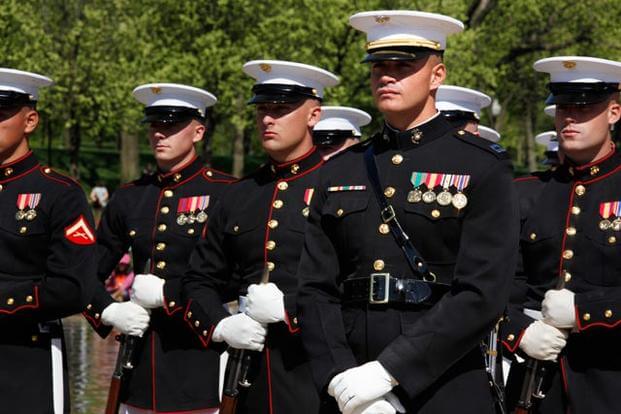Former U.S. Marine Corps major Brian Henry is now vice president for operations (officer recruiting) for Orion International, which helps place transitioning officers and enlisted service members in jobs across the country. We chatted with Maj. Henry about current hot opportunities in the job market and pulled a few tips for those looking to break into the civilian job market.
Military.com: What's your military and work background?
Brian Henry: "I was an infantry officer for 11 years and a Penn State grad, and I've been working at Orion ever since I transitioned out in 1998. I started as an account executive, then moved up to recruiter, operations manager and now I'm VP of operations. That's typical of most of the people who work here. We're all pretty much former military and were all job candidates ourselves at one point when we were making the transition.”
Military.com: How is recruiting for officers different, compared to recruiting for non-officers?
Brian Henry: "On the officer side, you have a degree, usually a four-year degree, as well as the leadership and management experience that you get out of the military. The types of jobs that officers are looking for are more on the professional level, involving some type of supervisory or leadership role.
"For enlisted, you focus on more of the technical skill sets they bring, whether it's technical training or hands-on tech skills, and typically they don't have a degree or extensive leadership experience. They may not vie for a management position, but there is crossover, like in the case of an NCO [noncommissioned officer] with 10 years of experience, someone who has been both a technician and a leader and has also gotten a degree.
"On the officer side, we focus on the transitioning junior officer, the guy who has been in the military for 4-10 years and is making a transition into a new career. That's the bulk of what we do, although we do place retiring officers as well."
Military.com: What's your read on the current job market for officers?
Brian Henry: "It's very promising. We're seeing a very good start to 2011, and in fact, we're getting back to the pace of placement that we had in 2007, when the economy was good. We are seeing a lot of companies hiring, with upticks in manufacturing, logistics, supply-chain-related industries, oil and gas, energy. We're also seeing opportunities in some construction facilities and professional sales, which bridges a lot of different industries. It's encouraging.
"A lot of clients and companies out there have a workforce aging problem, and the military officer candidate is a good fit, because they're looking to bring in people that are going to be future leaders and managers in these organizations."
Military.com: What do you see as the biggest challenges facing transitioning officers?
Brian Henry: "I think the biggest challenge in making the transition -- and this is where recruiters play such a big role -- is ,you have to get in front of a decision-maker that values your military background and can understand the translation between what you did in the military and how that applies to jobs that they're trying to fill. A lot of companies are looking at people who have done the exact job before.
"With the transitioning military candidate, they may not have done that exact job before, but they'll probably have done something similar, and they'll bring a lot of potential. They already have a lot of well-honed leadership skills, and they'll bring the ability to learn rapidly, assimilate and grow.
"So the challenge is getting in front of the right people, and that's where we come in as a recruiting firm. Once you find the right person inside the company, you're not running up against the idea of, 'You haven't done this exact job before.' The more opportunities a candidate has to get their foot in the door, the greater scope of opportunities they'll get presented."
Military.com: What programs do you have for transitioning veterans?
Brian Henry: "We have candidates that run the gamut. We may be talking to some up to two years before they transition out of the military, and then you have guys who are in the window right now, or people who transitioned earlier and are looking for a new job. We have a 'Long Way Out' program that focuses on individuals who have just made the decision to get out or know that they're getting out in a few years, and upon screening them, our recruiters help get them prepared, work on their resume, teach interviewing skills, ... have so when they're about four months from getting out, they're well-prepared to enter the interview phase of the job search.
"At that point, we have our hiring conferences, which is our No. 1 service and tool, where we bring in clients who are specifically interested in seeing transitioning military candidates. So you win that battle of getting in front of people who want to hire from the military, and our conference allows for face-to-face interaction in an efficient way.
"You're not just a resume anymore. You're in front of someone who you've been briefed on, so you've had a chance to research the company. You also get that big chance to talk about your background and relate it to the opportunity that you're interviewing for, which is pretty powerful.
"Companies will tell us they're looking for A, B, C and D in a candidate, but they'll actually end up talking to and hiring someone who may not fulfill all of those requirements, but has a great achievement profile in the military, someone who is very energetic and enthusiastic, someone with a great presentation and presence. Companies will expand what they're looking for once they meet people like that."
Military.com: Any advice you would give to transitioning officers?
Brian Henry: "One thing I would suggest is to have an open mind. A lot of our candidates don't have a great idea of what's out there and where they fit in. The best advice I can give is to be open to different opportunities. Prepare yourself to win every interview you have because you get to see so much more by doing that.
"If you really focus on the opportunity at hand, try to understand what you're interviewing for, what the position is and what the company needs, you get exposed to a lot of opportunities. You can always narrow your search once you figure out something isn't a fit, but people who limit themselves often pass up on perfect opportunities.
"Another thing is that if you're tied down to a particular location, it obviously limits your exposure to opportunities. So if you're getting out of the military and have some flexibility on where you can go, it opens a really wide net."
Want to Know More About the Military?
Be sure to get the latest news about the U.S. military, as well as critical info about how to join and all the benefits of service. Subscribe to Military.com and receive customized updates delivered straight to your inbox.











